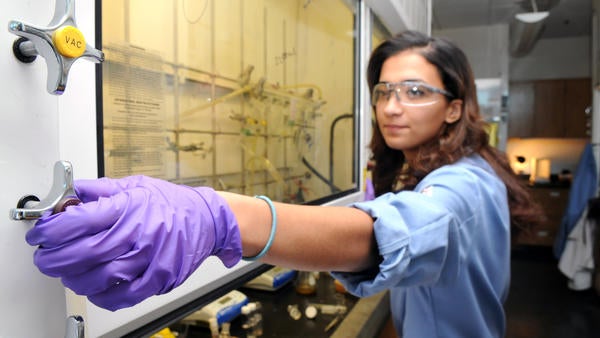All Ph.D. students in good standing are fully funded during their studies. The Ph.D. program at UCR is designed to provide students with the academic background, research experience, and professional development to make them successful and independent scientists. Emphasis is placed on creating a base of chemical knowledge that can serve as the foundation for fostering high-level critical and creative problem-solving skills.
Classes and Teaching
Beginning graduate students arrive in mid-September for TA training and to take orientation exams in the areas of Analytical, Inorganic, Organic and Physical chemistry. Based on previous coursework, performance on the placement exams, and discussion during individual meetings, the Graduate Advisor will determine a schedule of classes that will best meet each student’s needs. Students typically take 5-6 graduate classes (1-2 classes per quarter) to fulfill course requirements during their first year. Each research area (Analytical, Inorganic, Organic and Physical) also has a seminar course which all graduate students take every year (Chem. 251, 252, 253, and 254). After their first year, every student presents a 20-30 minute seminar once per year to students and professors in their area. This class is designed to provide students with valuable seminar presentation experience, as well as updating their peers on the progress of their research.
Choosing a Research Advisor
The Ph.D. is a research degree, and arguably the most important task of a student during the first year of graduate study is to choose a research area and faculty advisor. Chemical research at UCR spans a wide range of areas, and students are encouraged to investigate broadly before choosing a research advisor. Interdisciplinary research and joint research projects are encouraged. Feel free to contact individual faculty members to discuss opportunities within their labs. Phone numbers and E-mail addresses are in provided in the Faculty Profiles on this website. Students are encouraged to choose a research group by January of their first year.
Advancement to Candidacy
Shortly after completion of their first year, students participate in a Second Year Research Evaluation (SYRE) that covers each student's individual research topic. The SYRE consists of writing a short research proposal that discusses their proposed Ph.D. research and their progress to date, and presenting that proposal to a committee of three faculty members orally. The SYRE provides students an opportunity to receive early feedback on their research progress and helps prepare them for the format of the Qualifying Exam. Towards the end of their second year, students take the Qualifying Exam. It consists of two research proposals: an independent research proposal on work unrelated to the student’s Ph.D. research, and a separate proposal on the student’s own Ph.D. research. The student prepares short written proposals for each topic and then presents and defends them orally. Upon successful completion of the exam, the student is officially advanced to candidacy. There are no cumulative exams.
Thesis Defense
After a student has completed all the requirements for advancement to candidacy, there are no more requirements until the thesis is completed and submitted to the committee. On average, this occurs in the student’s 5th year. Successful completion of the Thesis Defense includes evaluation of the written document and oral presentation of the research to the committee, after which the student is officially awarded the Ph.D. degree.

